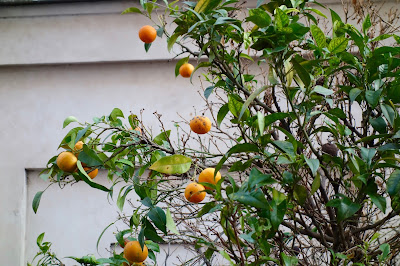 |
| The Roman Empire in 117 A.D. |
The Romance of the Romans
The Roman Empire took its time
to disintegrate and we can argue about exactly when and exactly how, but let’s
leave that for another day and place our vote for 476 A.D. , when Romulus, the
last Roman Emperor, was overthrown by a Germanic leader, Odoacer. After some 1500 years, the Roman Empire was
no more, but of course that includes the time the Empire was split into east
and west. If you want to only consider
the time it was what we think of as the united Roman Empire, then it lasted
just over 500 years..
So, Rome is not worth thinking
about, right? Surprise, surprise!! There are still vestiges of Roman life and
Roman culture all around us.
Take the Romance languages for
example that all emanated from Latin:
French, Spanish, Italian, Portuguese, Romanian and Catalan. The
widespread of Romance Languages means through the centuries, at least
linguistically, Roman influence has stretched, not only around the
Mediterranean region, but North and South and Central America, along with parts
of Africa! Wait, I forgot to mention the
Philippines. Yep, don’t forget Spain
owned the Philippines for decades. I met
a Filipina/American in Japan and asked her if she spoke Tagalog or Filipino and
she said, no. “On our island we spoke only Spanish.”
“Oh yeah?” you say, what about
English? Glad you mentioned that.
Linguists say that English, although called a Germanic language, takes 65% of
its words from French! Just one example: all the words ending in …ion are written the
same in French and English, but pronounced differently. As the French Prime Minister George
Clemenceau (1841-1929) famously said,
“English is just badly pronounced French.”
But is there nothing more than
language? Nothing more???? Are you
kidding?
We still use the Roman
Gods. Really? Yep.
In the days of the week.
The Romans copied the Babylonians
in naming some of the days of the week after heavenly bodies, which we still
use today.
Monday – Moon Day (Luna)
Sunday – Sun Day (Sol
invictus)
And the Roman threw in one of
their own for Saturday. Saturn.
As you know from the phrase,
all roads lead to Rome, the Romans built a lot of roads all over the
Empire. Hundreds, if not thousands of
them still exist and often are in use today, although you may not realize it. Some have been paved over. In all the Romans built over 250,000 miles of
roads, with over 50,000 miles of them paved.
 |
| Roman Roads in only one small part of Germany |
And not just the roads, but so
much more. Go to Segovia and see the
huge aqueduct that was in service and still moving water to the city until the
early 1970s. Take a look at Hadrian’s Wall in the north of Britain.
 |
| Aqueduct in Segovia, Spain |
How about place names? Rome, of course is still Rome, and Londinium
we know as London, and look at the very name of Britain, from the Latin, Britannia.!
Parisiorm is now Paris. In Spain, Segovia is still Segovia. The list goes on and on.
Let’s not forget the foods and
animals the Romans introduced wherever they went. If you missed it on a previous blog, read
through the Romans in Britain and you’ll spot fruits and vegetables galore.
Did you know our own sense of
the rule of law is based heavily on Roman law?
The rights of personal
property.
The validity of contracts.
The right to vote.
The right to pay taxes.
The right to appeal and the
legal status of corporations.
An accused person had the
right to a defense and was innocent until proven guilty.
Here’s something dear to your
hearts: Wine! Look along the Rhine and Mosel valleys in
Germany, the notable vineyards in France (Bordeaux) and Italy and even Spain
(Rioja). I haven’t begun to name them
all. Romans believed wine was essential
to life and everyone drank it, even the poor Romans and the slaves.
“There with the wine before
you, you will tell of many things.”
Ovid, Roman Poet, 43 B.C. – 17 A.D.
Husbands and wives should remember this!
“The great evil of wine is
that it first seizes the feet. It is a
crafty wrestler.” Titus Maccius, Roman playwright (254 -184 B.C.)
Something you might not know
about Rome:
The Colosseum was not called
the Colosseum when it was built (between 72-80 A.D.), but Amphitheatrium
Flavium after the two emperors who build it.
Around 1000 A.D. the word Colosseum came into use, but even then it didn’t
mean the building itself, but an enormous statue of possibly Emperor Nero. The statue has since disappeared.
The city has grown taller. If you visit some of Rome’s major sights of
antiquity, you’ll notice you have to walk down. The Forum and the Pantheon are
good examples.
Look around and you’ll soon
find, the Roman Empire may have fallen, but many of the buildings, the
language, and the Roman ideas live on.
Now I think it’s time to drink
a little wine and think about that.




























